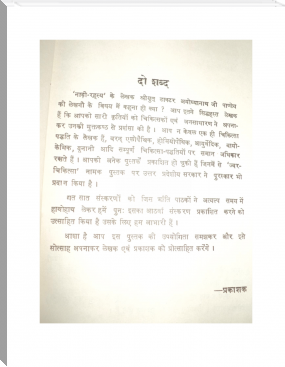LYSBETH, H. RIDER HAGGARD [brene brown rising strong txt] 📗

- Author: H. RIDER HAGGARD
Book online «LYSBETH, H. RIDER HAGGARD [brene brown rising strong txt] 📗». Author H. RIDER HAGGARD
At breakfast the following morning, when Elsa did not appear, the pair met.
"You look pale, Adrian," said his father presently. "I fear that this wild weather kept you awake last night, as it did me, although at your age I have slept through the roar of a battle. Well, have you thought over our conversation? I do not wish to trouble you with these incessant family matters, but times presses, and it is necessary to decide."
Adrian looked out of the lattice at the snow, which fell and fell without pause. Then he turned and said:
"Yes. Of the two it is best that she should marry me, though I think that such a crime will bring its own reward."
"Wise young man," answered his father. "Under all your cloakings of vagary I observe that you have a foundation of common-sense, just as the giddiest weathercock is bedded on a stone. As for the reward, considered properly it seems to be one upon which I can heartily congratulate you."
"Peace to that talk," said Adrian, angrily; "you forget that there are two parties to such a contract; her consent must be gained, and I will not ask it."
"No? Then I will; a few arguments occur to me. Now look here, friend, we have struck a bargain, and you will be so good as to keep it or to take the consequences--oh! never mind what they are. I will bring this lady to the altar--or, rather, to that table, and you will marry her, after which you can settle matters just exactly as you please; live with her as your wife, or make your bow and walk away, which, I care nothing so long as you are married. Now I am weary of all this talk, so be so good as to leave me in peace on the subject."
Adrian looked at him, opened his lips to speak, then changed his mind and marched out of the house into the blinding snow.
"Thank Heaven he is gone at last!" reflected his father, and called for Hague Simon, with whom he held a long and careful interview.
"You understand?" he ended.
"I understand," answered Simon, sulkily. "I am to find this priest, who should be waiting at the place you name, and to bring him here by nightfall to-morrow, which is a rough job for a Christian man in such weather as this."
"The pay, friend Simon, remember the pay."
"Oh! yes, it all sounds well enough, but I should like something on account."
"You shall have it--is not such a labourer worthy of his hire?" replied his employer with enthusiasm, and producing from his pocket the purse which Lysbeth had given Adrian, with a smile of peculiar satisfaction, for really the thing had a comic side, he counted a handsome sum into the hand of this emissary of Venus.
Simon looked at the money, concluded, after some reflection, that it would scarcely do to stand out for more at present, pouched it, and having wrapped himself in a thick frieze coat, opened the door and vanished into the falling snow.
CHAPTER XXVI(THE BRIDEGROOM AND THE BRIDE)
The day passed, and through every hour of it the snow fell incessantly. Night came, and it was still falling in large, soft flakes that floated to the earth gently as thistledown, for now there was no wind. Adrian met his father at meals only; the rest of the day he preferred to spend out of doors in the snow, or hanging about the old sheds at the back of the mill, rather than endure the society of this terrible man; this man of mocking words and iron purpose, who was forcing him into the commission of a great crime.
It was at breakfast on the following morning that Ramiro inquired of Black Mag whether the Jufvrouw Brant had sufficiently recovered from the fatigues of her journey to honour them with her presence. The woman replied that she absolutely refused to leave her room, or even to speak more than was necessary.
"Then," said Ramiro, "as it is important that I should have a few words with her, be so good as to tell the young lady, with my homage, that I will do myself the honour of waiting on her in the course of the forenoon."
Meg departed on her errand, and Adrian looked up suspiciously.
"Calm yourself, young friend," said his father, "although the interview will be private, you have really no cause for jealousy. At present, remember, I am but the second string in the bow-case, the understudy who has learnt the part, a humble position, but one which may prove useful."
At all of which gibes Adrian winced. But he did not reply, for by now he had learned that he was no match for his father's bitter wit.
Elsa received the message as she received everything else, in silence.
Three days before, as after a fearful illness during which on several occasions she was at the very doors of death, Lysbeth van Goorl had been declared out of danger, Elsa, her nurse, ventured to leave her for a few hours. That evening the town seemed to stifle her and, feeling that she needed the air of the country, she passed the Morsch poort and walked a little way along the banks of the canal, never noticing, poor girl, that her footsteps were dogged. When it began to grow dusk, she halted and stood a while gazing towards the Haarlemer Meer, letting her heart go out to the lover who, as she thought and hoped, within a day or two would be at her side.
Then it was that something was thrown over her head, and for a while all was black. She awoke to find herself lying in a boat, and watching her, two wretches, whom she recognised as those who had assailed her when first she came to Leyden from The Hague.
"Why have you kidnapped me, and where am I going?" she asked.
"Because we are paid to do it, and you are going to Adrian van Goorl," was the answer.
Then she understood, and was silent.
Thus they brought her to this lonesome, murderous-looking place, where sure enough Adrian was waiting for her, waiting with a lie upon his lips. Now, doubtless, the end was at hand. She, who loved his brother with all her heart and soul, was to be given forcibly in marriage to a man whom she despised and loathed, the vain, furious-tempered traitor, who, for revenge, jealousy, or greed, she knew not which, had not hesitated to send his benefactor, and mother's husband, to perish in the fires of the Inquisition.
What was she to do? Escape seemed out of the question, imprisoned as she was on the third story of a lofty mill standing in a lonely, snow- shrouded wilderness, cut off from the sight of every friendly face, and spied on hour after hour by two fierce-eyed women. No, there was only one escape for her--through the gate of death. Even this would be difficult, for she had no weapon, and day and night the women kept guard over her, one standing sentinel, while the other slept. Moreover, she had no mind to die, being young and healthy, with a love to live for, and from her childhood up she had been taught that self- slaughter is a sin. No, she would trust in God, and overwhelming though it was, fight her way through this trouble as best she might. The helpless find friends sometimes. Therefore, that her strength might be preserved, Elsa rested and ate of her food, and drank the wine which they brought to her, refusing to leave the room, or to speak more than she was obliged, but watching everything that passed.
On the second morning of her imprisonment Ramiro's message reached her, to which, as usual, she made no answer. In due course also Ramiro himself arrived, and stood bowing in the doorway.
"Have I your permission to enter, Jufvrouw?" he asked. Then Elsa, knowing that the moment of trial had come, steeled herself for the encounter.
"You are master here," she answered, in a voice cold as the falling snow without, "why then do you mock me?"
He motioned to the women to leave the room, and when they had gone, replied:
"I have little thought of such a thing, lady; the matter in hand is too serious for smart sayings," and with another bow he sat himself down on a chair near the hearth, where a fire was burning. Whereon Elsa rose and stood over against him, for upon her feet she seemed to feel stronger.
"Will you be so good as to set out this matter, Senor Ramiro? Am I brought here to be tried for heresy?"
"Even so, for heresy against the god of love, and the sentence of the Court is that you must expiate your sin, not at the stake, but at the altar."
"I do not understand."
"Then I will explain. My son Adrian, a worthy young man on the whole-- you know that he /is/ my son, do you not?--has had the misfortune, or I should say the good fortune, to fall earnestly in love with you, whereas you have the bad taste--or, perhaps, the good taste--to give your affections elsewhere. Under the circumstances, Adrian, being a youth of spirit and resource, has fallen back upon primitive methods in order to bring his suit to a successful conclusion. He is here, you are here, and this evening I understand that the priest will be here. I need not dwell upon the obvious issue; indeed, it is a private matter upon which I have no right to intrude, except, of course, as a relative and a well-wisher."
Elsa made an impatient movement with her hand, as though to brush aside all this web of words.
"Why do you take so much trouble to force an unhappy girl into a hateful marriage?" she asked. "How can such a thing advantage you?"
"Ah!" answered Ramiro briskly, "I perceive I have to do with a woman of business, one who has that rarest of gifts--common sense. I will be frank. Your esteemed father died possessed of a very large fortune, which to-day is your property as his sole issue and heiress. Under the marriage laws, which I myself think unjust, that fortune will pass into the power of any husband whom you choose to take. Therefore, so soon as you are made his wife it will pass to Adrian. I am Adrian's father, and, as it happens, he is pecuniarily indebted to me to a considerable amount, so that, in the upshot, as he himself has pointed out more than once,





Comments (0)